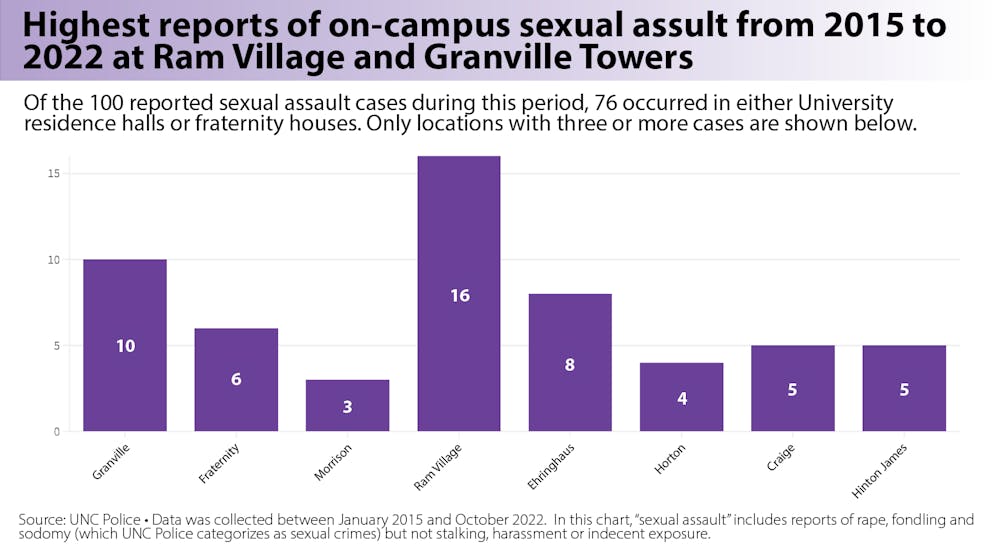“In that space, I would expect it is because we just have more trained staff who know what to look for,” she said. “But, I think it’s also a question that often comes up with looking at data to reflect lived experiences — is it because it’s happening more in these spaces? Or are we just getting more reports from these areas as opposed to other areas?”
When the Office receives a report, staff — occasionally in consultation with a response team of UNC Police, the Dean of Students Office and/or the Office of Human Resources — will evaluate the report to determine if the alleged conduct violates Title IX and whether further action is warranted or wanted by the reporting party.
To properly address these sexual assault reports, the EOC Office has hired a fourth report and response coordinator, along with a sixth investigator, UNC Media Relations said in a statement. This expands the office to 21 employees.
“This has significantly increased the resources UNC-Chapel Hill can provide to help students, faculty and staff with any instances of sexual assault, sexual harassment and discrimination,” the statement said.
Assaults can be reported through the EOC Office, Chapel Hill or UNC police departments. Another way sexual assault can be reported is through a Responsible Employee, Gibson said. Typically a dean or department chairperson, Responsible Employees at UNC include “any employee who has the authority to take action to redress sexual violence,” according to the EOC website.
They are required to share any information to the Office as soon as possible, even sometimes without the survivor's consent, Gibson said.
The annual EOC data reports for academic years 2015–16 through 2020–21 cited that the Office formally investigated 68 reports of sexual assault over the six-year period.
Formal investigations require contacting the responding party, or the accused individual, and informing them of the report filed against them. This can potentially compromise the emotional and physical safety of the reporting party, or the assaulted individual, Gibson said.
Because of this risk, many assaulted individuals opt to file an informal report, in which the EOC Office concludes a resolution that focuses more on supportive measures rather than action against the responding party.
In these instances of informal investigations and informal resolutions, the EOC Office “provides information, support and assistance with supportive measures,” which include academic accommodations, housing changes or no contact orders.
During the same six-year period, the Office received 531 informal reports of sexual assault.
For many survivors of sexual assault who choose to report — whether that be through the EOC Office or law enforcement — the criminal or civil restraining order process can be additionally traumatic, Gigi Warner, a supervising attorney with expertise in sexual assault at Legal Aid of North Carolina, said.
To get the day's news and headlines in your inbox each morning, sign up for our email newsletters.
“A victim of a crime like this can often feel very judged for different decisions they made, they can feel like they won’t be believed, they can feel like it’s just not worth the huge amount of emotional stress and time and energy,” Warner said.
“Prosecution declined,” means that although an arrest was made, the prosecutor did not formally pursue charges.
This can happen when the district attorney’s office, which is responsible for prosecuting accused suspects after charges are pressed, believes there is not enough evidence for a case to hold up in court, Warner said.
The status can also be “cleared” if a “victim refused to cooperate,” which occurs when the survivor recants their statement or declines to work with the prosecution.
Only three of the 100 cases that have occurred over the eight years remain open.
Warner said this number “doesn’t surprise” her. She also said this is because many survivors are either wary of law enforcement and the legal system or know that the process to secure a sexual assault conviction can be “extremely grueling.”
“My advice would just be that each victim of this kind of crime needs to do what is best for them, is going to let them thrive and get through their day-to-day,” Warner said.
She also said in addition to the University holding perpetrators accountable, fostering an honest dialogue among students about not leaving each other in vulnerable situations is crucial.
Despite not formally reporting through the EOC Office, Brigman said her friends defended her when she was confronted with the person who assaulted her.
To increase safety on campus, the University is currently working on installing additional security cameras outside residence halls. The project was presented to the Board of Trustees Audit, Compliance and Risk Management Committee and given priority for funding after safety concerns were raised.
Editor's Note: Brianna Brigman used to be an employee of The Daily Tar Heel.
@ashnqm
university@dailytarheel.com
Ashley QuincinAshley Quincin is a 2023-24 assistant university desk editor at The Daily Tar Heel. She has previously served as a university staff writer. Ashley is a senior pursuing a degree in English and comparative literature, with a double minor in media and journalism and composition, rhetoric and digital literacy.



